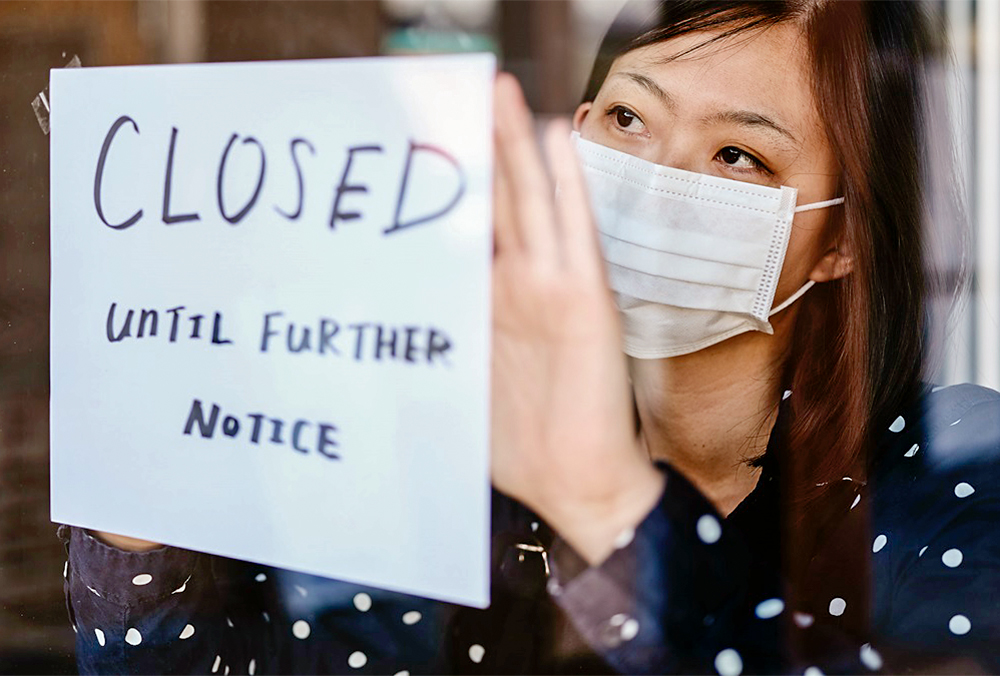That Monday was to be one of the biggest days of her career. In just under a decade, Claire Theaker-Brown, '08 BA, had taken her line of belts from a small operation in Shanghai to a North America-wide brand for sale in almost 400 stores. The American talk show The View was poised to feature her product in front of an audience of more than two million people.
But that Monday was March 16 - the week COVID-19 changed everything across North America. Thousands of businesses and schools were closed, millions of employees were laid off or sent home to work, and daily TV shows - including talk shows - were cancelled or completely reworked. In an instant, companies like Theaker-Brown's had to brace themselves for marketplaces turned upside down.
"One thing I've become really good at over the years is reserving my emotional reaction until I have facts in hand," says Theaker-Brown, who is a mentee with the Threshold Impact University of Alberta Venture Mentoring Service.
Her patience paid off because The View did go to air (without a studio audience), with Theaker-Brown's company, Unbelts, featured on the coveted View Your Deal segment. Over the next four days, Theaker-Brown and her team - strung together by video chat in three countries - figured out how to ship hundreds of thousands of dollars of belts to deal-hungry shoppers who had watched the show.
Theaker-Brown counts her business as fortunate. With online making up two-thirds of her sales, she's confident Unbelts will survive. Thousands of other businesses will not be as lucky. One-third of small businesses that have closed due to COVID-19 won't reopen, according to a Canadian Federation of Independent Business survey at the end of March. The federal government has promised to cover three-quarters of the payroll for companies that have seen a significant revenue drop.
LISTEN: Theaker-Brown shares her business journey and her strategy for weathering the COVID-19 crisis.
Governmental help aside, business experts say adaptation is key for small businesses to rebound once COVID-19 restrictions ease. Karina Birch, '99 BCom, says she didn't take forward planning seriously until the southern Alberta floods of June 2013 ravaged Canmore, Alta., the town where her soap company is based.
"At that time, we were absolutely not prepared," says Birch, CEO of Rocky Mountain Soap. "We didn't even have a full employee list of addresses and phone numbers. We couldn't access the office, which had most of our information."
This time she was prepared. Birch and her managers set up a seven-person emergency response team that meets daily by video and examines all aspects of the business. One of the earliest and most agonizing decisions was to close all 13 of the company's retail stores. The focus shifted to online sales, which understandably picked up, given that soap is the most effective weapon against the virus. Rocky Mountain Soap has also rushed its own hand sanitizer to market.
LISTEN: Why Birch is thankful she kept her business focused on soap.
Meanwhile, artists and performers have turned to technology to keep revenue flowing and audiences loyal. Online concerts and performances have proliferated, with headliners like Neil Young and Jann Arden. Even the New York City-based Metropolitan Opera is releasing free nightly streams of past performances.
In Edmonton, Shannon Blanchet, '06 BFA, '19 MFA, and fellow actors have moved their weekly improvised soap opera, DieNasty, online. Although no performers rely on the show to pay rent, Blanchet says it's a vital way to keep its audience of regulars connected - so that hopefully they return to live theatre once life gets back to normal. "Video is a whole new sandbox for us to play in," Blanchet says. "And it's fun for the audience as they try to figure what the heck we're doing."
LISTEN: How Blanchet and fellow improv actors made a bark-happy dog part of the show.
As business owners everywhere try to improvise their way through the world's biggest crisis since the Second World War, Blanchet, Birch and Theaker-Brown offer these tips:
Tip 1: Find something to offer your community. Where feasible, all three grads say that supporting your neighbours through the crisis is key. For its part, Birch's soap company is donating more than 400 bottles of its new hand sanitizer to vulnerable groups.
Tip 2: Lead with your values. From the day she started Unbelts, Theaker-Brown has made ethical manufacturing integral to her business. She believes companies that put their values over profit stand the best chance of surviving COVID-19. "I think the result is going to be people having a really different relationship with the businesses that show up to play the role of community champion."
Tip 3: Challenge yourself. Blanchet says keeping her weekly improv going has challenged her creatively and helped her avoid falling into despair. "It'd be easy to get really sad and feel hopeless if I didn't have things to look forward to and feed my energy."
Tip 4: Ask your network for help. Birch says with the economy changing so fast, it was crucial that she ask other business owners how they navigated issues like health and safety and managing store closures. "It's easy to just put your head down and focus on your business. But sharing information is really valuable."

We at New Trail welcome your comments. Robust debate and criticism are encouraged, provided it is respectful. We reserve the right to reject comments, images or links that attack ethnicity, nationality, religion, gender or sexual orientation; that include offensive language, threats, spam; are fraudulent or defamatory; infringe on copyright or trademarks; and that just generally aren’t very nice. Discussion is monitored and violation of these guidelines will result in comments being disabled.